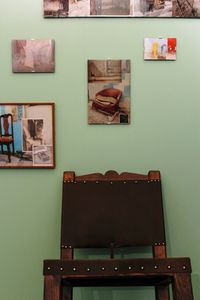MATANDO EL RATO
KILLING TIME
Pohoto-Installation
400 cm width x 250 cm heigh x 40 cm length
2024
Following the thread of the current customs and traditions of our people, the moment of the talk neighborhood in the afternoon has become a ritual inseparable from the idiosyncrasy of ordinary Cubans. Pulling out a chair to feel comfortable, chat and find out the latest is also creating an identity. Along with the chair, are the photographs of the chairs that are used daily to carry out a socialization ritual with others and wait for the hours to pass. Exercise that is performed daily as a daily guideline.
The chair that separated from the table and acquired autonomy and its own expression, today is also separated from the interior of the house and turns to the outside giving the social fabric of the street in a native expression. That intimacy of the chair within the home is lost as a result of sharing the experience and the dialogue.
The chair also contains certain added values in Cuban social context: the gestation of local or passing identities (it is precisely at this moment when socialization is supposed to be a solution to the everyday boredom), laziness (because in the first instance the image of this object is conceptualized as an expression that the Cuban has finished their day of work and that they have nothing more to do) and in contrast to the latter the reflective intellectual activity on the most immediate.
Everyday life turns this image into a paradigm of continued waiting, a symbol of physical fatigue that in turn entails a spontaneous relationship with the gesture of immortalizing a “minor” tradition. The interest is to capture this sphere of the “History” of everyday life. This gesture wants to enable the understanding of those social agents who are mostly those called voiceless but who nevertheless have an impact on the construction of local and national history. It is in the street where the historical and identity processes, where virtues (ought to be, being, sympathy, compassion, trust, work, justice, shame) and vices (cheating, indolence, opportunism, Cubanism, corruption, lack of punctuality, illegality) color society; and the chair is in part one of those places where these moral qualities that appear as essential in our civil society are concretized.
